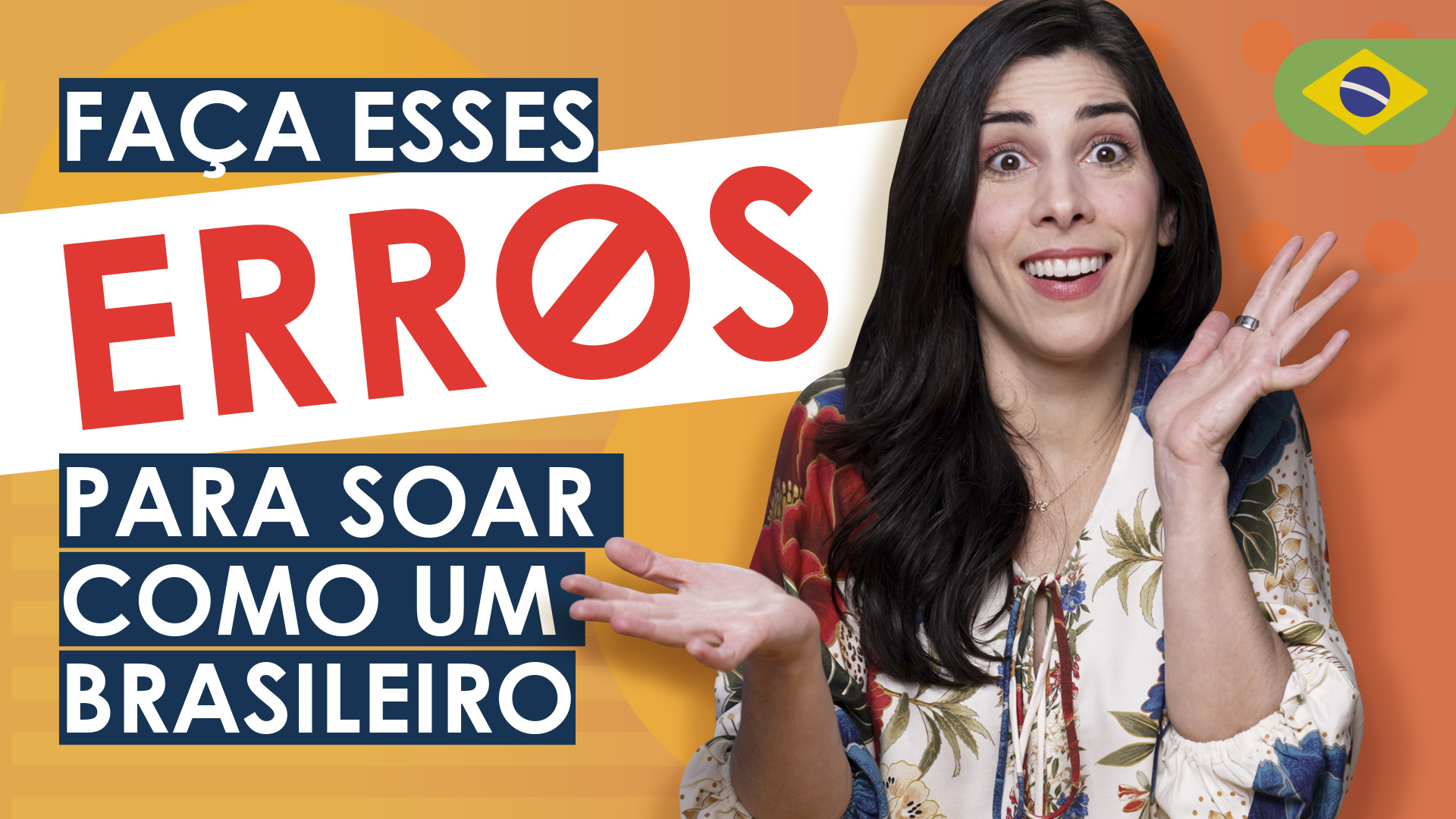Join the Speaking Brazilian YouTube Club to have access to the transcript of this video and many other videos.
In this lesson, we are going to talk about the 15 main verb tenses used in Brazilian Portuguese.
What is the Indicative and Subjective Mood?
The indicative mood is used to express facts and certainties, while the subjunctive mood is used to express hypotheses and uncertainties. Each of these moods includes several tenses.
What is a tense?
Verb tenses indicate when the action takes place.
The main verb tenses in the Portuguese language are the present, the past (also called the preterite) and the future.
A tense can be simple (when using a single verb) or compound (when using an auxiliary verb + the main verb).
The 15 main tenses used in Brazil
To make it easier for you to compare verb tenses, I will always use the same verb: the regular verb “estudar”/“to study.”
1. Presente do Indicativo – Present Indicative (simple present)
This tense is used to talk about current facts, permanent states and habitual actions.
Joana ESTUDA português todos os dias. (Joana studies Portuguese every day.)
2. Pretérito Perfeito do Indicativo – Past Perfect Indicative (simple past)
This tense is used to talk about an action that happened and was completed in the past.
Joana ESTUDOU português ontem. (Joana studied Portuguese yesterday.)
3. Pretérito Imperfeito do Indicativo – Past Imperfect Indicative
This tense is used to talk about habitual actions in the past or to describe and narrate stories.
Joana ESTUDAVA português quando era mais jovem. (Joana used to study Portuguese when she was younger.)
4. Futuro do Indicativo – Future Indicative (simple future)
This tense is used to talk about something that will happen in the future.
Joana ESTUDARÁ português amanhã. (Joana will study Portuguese tomorrow.)
In addition to the “futuro do presente” (simple future), we also use the verbal phrase known as “futuro imediato” (immediate future), which has exactly the same meaning but is used in more informal language.
Joana VAI ESTUDAR português amanhã. (Joana is going to study Portuguese tomorrow.)
5. Futuro do Pretérito do Indicativo – Conditional Indicative
This tense is used to talk about a future action that depends on another.
Joana ESTUDARIA português amanhã se tivesse tempo. (Joana would study Portuguese tomorrow if she had time.)
6. Pretérito Perfeito Composto do Indicativo – Compound Past Perfect Indicative
This tense is used to talk about an action that began in the past and continues into the present.
Joana TEM ESTUDADO português ultimamente. (Joana has been studying Portuguese lately.)
7. Pretérito Mais-que-perfeito Composto do Indicativo – Compound More-than-perfect Indicative
This tense is used to talk about an action that happened in the past before another action in the past.
Joana já TINHA ESTUDADO português quando viajou ao Brasil. (Joana had already studied Portuguese when she traveled to Brazil.)
8. Futuro Composto do Indicativo – Compound Future Indicative
This tense is used to talk about an action in the future that will be finished before another action in the future.
Joana TERÁ ESTUDADO português quando viajar ao Brasil. (Joana will have studied Portuguese when she travels to Brazil.)
9. Futuro do Pretérito Composto do Indicativo – Compound Conditional Indicative
This tense is used to talk about an action that could have happened in the past if something else had happened.
Joana TERIA ESTUDADO português se tivesse tido tempo. (Joana would have studied Portuguese if she had had the time.)
10. Presente do Subjuntivo – Present Subjunctive
This tense is used to talk about hypotheses, desires or assumptions.
Talvez Joana ESTUDE português hoje à tarde. (Maybe Joana will study Portuguese this afternoon.)
11. Pretérito Imperfeito do Subjuntivo – Past Imperfect Subjunctive
This tense is used to indicate a condition.
Se Joana ESTUDASSE português, poderia falar com brasileiros. (If Joana studied Portuguese, she could speak to Brazilians.)
12. Futuro do Subjuntivo – Future Subjunctive
This tense is used to talk about the possibility of something that might happen in the future.
Quando Joana ESTUDAR português, poderá falar com brasileiros. (When Joana studies Portuguese, she will be able to speak with Brazilians.)
13. Pretérito Perfeito Composto do Subjuntivo – Compound Past Perfect Subjunctive
This tense is used to talk about an action that may have been completed in the past. It indicates uncertainty.
Talvez Joana TENHA ESTUDADO português, mas ela não me disse. (Maybe Joana studied Portuguese, but she didn’t tell me.)
14. Pretérito Mais-que-perfeito Composto do Subjuntivo – Compound More-than-perfect Subjunctive
This tense is used to talk about a hypothetical action prior to another action in the past.
Se Joana TIVESSE ESTUDADO português, teria se comunicado melhor com os brasileiros. (If Joana had studied Portuguese, she would have communicated better with Brazilians.)
15. Futuro Composto do Subjuntivo – Compound Future Subjunctive
This tense is used to talk about an action that will possibly be finished before another action in the future.
Quando Joana já TIVER ESTUDADO português, poderá se comunicar melhor com os brasileiros. (When Joana has already studied Portuguese, she will be able to communicate better with Brazilians.)
That’s it, everybody! This was a brief explanation of the 15 main tenses used in Brazilian Portuguese.
Now it’s homework time! Write a comment below using one of the 15 main verb tenses.
Até a próxima!
Your teacher,
Virginia


